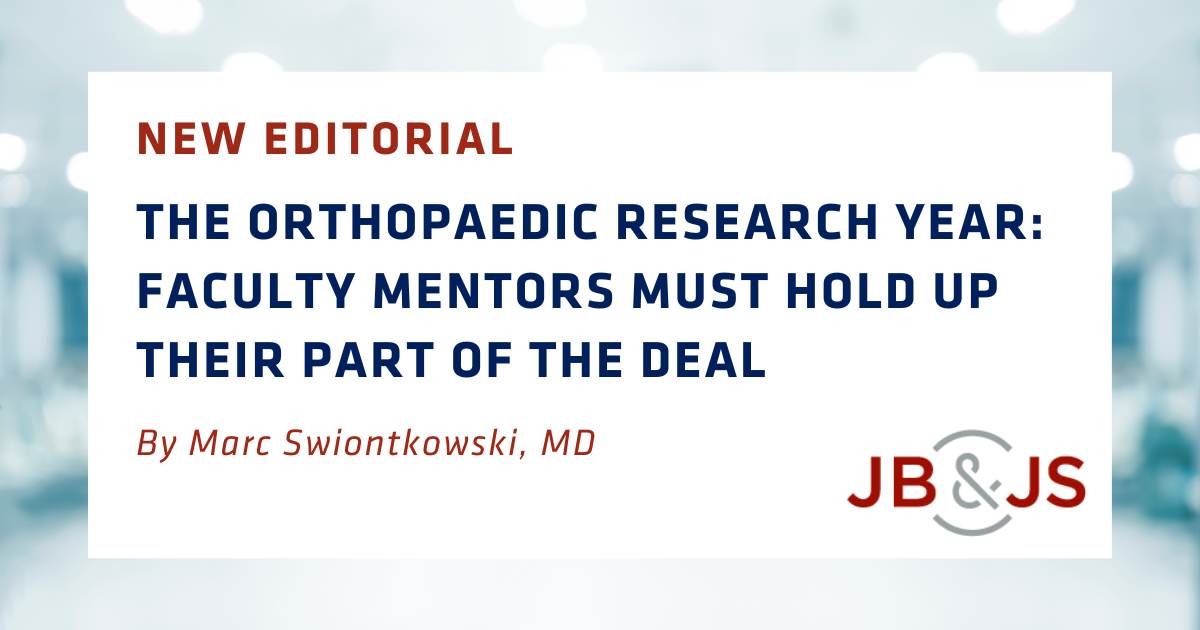An increasing number of medical students are opting for a research year prior to residency. Some 11% to 17% of applicants to U.S. orthopaedic surgery residencies participate in a research year, note Tidd and Piuzzi in a new JBJS Orthopaedic Forum article: A Research Year for Medical Students
Their article presents insights on the benefits and challenges of the research year, selecting a mentor or mentee, and setting expectations and goals, among other topics related to the research year experience. The authors are themselves a medical student who completed a research year and an orthopaedic surgeon who has mentored students as the Director of Cleveland Clinic Adult Reconstruction Research (CCARR). Read the article at JBJS.org.
For many, the research year can provide opportunities for professional growth, as students gain exposure to the field and participate in research projects and publications. Many students see the research year as an avenue for increasing their competitiveness in residency selection.
However, while mentorship guidance is instrumental to a successful research year, a new JBJS editorial reminds the orthopaedic community of its responsibility to students when serving as faculty mentors. Read the editorial: The Orthopaedic Research Year: Faculty Mentors Must Hold up Their Part of the Deal
Editor-in-Chief Dr. Marc Swiontkowski writes that Tidd and Piuzzi provide valuable information on selecting an institution and mentor. During his own travels to journal clubs and meetings, he has encountered students who have not been appropriately mentored. “Frequently, instead of being educated in appropriate research design and conduct, they are left on their own to conduct ill conceived retrospective chart reviews. This not only fails students by not advancing their education but also hurts our field because it sours highly intelligent young people on the idea of pursuing an academic career. These students quickly pick up that they are being used to advance the faculty member’s career without receiving any lasting benefit other than listing submissions or publications on their applications. This failure also clutters the literature with published manuscripts that do little to advance patient care.”
He notes that the issue is being addressed by the Council of Residency Directors (CORD) through symposia and open discussions. Dr. Swiontkowski further suggests that department chairs and residency directors set and enforce a policy that “(1) no faculty may accept students for a research year without a planned curriculum that covers appropriate research design and conduct, (2) the mentor must have experience discussing the literature in journal clubs and case conferences, and (3) students can only be involved in projects that have been well vetted by experienced clinical practitioners or basic-science research scientists.”
He delves further into this important topic in a recent episode of the OrthoJOE podcast with co-host Dr. Mo Bhandari. Says Dr. Swiontkowski, “If we’re going to be taking these students on, we really need to mentor them and make sure the year is of value.” Listen to the conversation at JBJS.org: The Orthopaedic Residency Research Year: A Call for Action
Access the article by Tidd and Piuzzi: A Research Year for Medical Students
Access the editorial: The Orthopaedic Research Year: Faculty Mentors Must Hold up Their Part of the Deal



